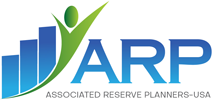The ARP educational philosophy - At ARP we believe that education must address all three of the disciplines that comprise the reserve study process – component knowledge, valuation knowledge, and financial knowledge. ARP is dedicated to providing education in all three areas to help reserve professionals make sure they have the appropriate skills to serve their reserve study clients.
Recognizing that reserve professionals have differing backgrounds and SKE (Skills, Knowledge, and Experience) ARP has designed a structured educational approach to provide the information that reserve professionals are most likely to require in the normal course of their work. Education is broken into the following general categories:
1) Fundamentals of the reserve study process - understanding the general conceptual foundation of reserve studies, including the basics of all three disciplines comprising the reserve study process
2) Valuation and pricing of components – understanding what goes into the concept of cost, sources of pricing information, basic construction estimating principles, and understanding the accounting processes involved where associations “self-construct” major projects.
3) Financial education - understanding financial modeling, calculations and reporting. The reserve study is a financial projection and basic financial knowledge is required for reserve professionals. Most reserve professionals are strong on component knowledge but have little, if any, financial training. The goal is to provide an understanding of how financial calculations work and the basic financial reporting protocols that are required in the financial world.
4) Component knowledge is by far the most challenging area because the body of knowledge of this subject is so large compared to the subjects of valuation and financial knowledge. Component knowledge literally encompasses thousands of physical components encountered in ordinary situations plus knowing when costs related to non-physical activities should be included in the reserve study process. To meet this challenge ARP has recognized that two levels of education are necessary, the broad exposure to specific systems or components at the high level, followed by what we call “deep dive” courses into those same components.
A) The broad exposure courses are intended to provide reserve professionals with enough general knowledge to understand the function of components and how they work. ARP has designed a series of “core courses” at this overview level to provide a basic level of knowledge on the physical components most commonly encountered in reserve studies in the community association arena. These courses provide the reserve professional with a good breadth of knowledge on a variety of topics.
B) For component knowledge at the detail level ARP is working with various experts to create a series of in-depth courses that take reserve professionals to the next level by providing them with a higher level of expertise on any number of given component topics. These courses provide the reserve professional with a good depth of knowledge on a variety of topics.
Our educations offerings consist of the following:
· Annual Conference – ARP hosts an annual conference providing a minimum of 8 hours of education on reserve study and maintenance related topics. Starting in 2022 the conference will be 100% virtual. Presentations are generally scheduled as 60, 90, or 120 minutes duration depending on the topic and depth of “the dive” into the topic. ARP charges a fee for the annual conference and attendees may attend the entire conference or select individual webinars. No compensation is provided to speakers, who benefit from the exposure they receive from the webinar. Webinar format generally means that attendees can view only and submit questions via chat or Q and A mode. All webinars are recorded and posted to the ARP website.
· Stand-alone presentations – Most of these are offered on a free basis, although ARP reserves the right to charge a fee for selected presentations. It is this format where we are more likely to recommend that “deep dive” topics be presented. For this format we don’t have any strict time limitations – in other words, take whatever time is necessary for a comprehensive presentation and don’t worry about the clock ticking. Webinar format generally means that attendees can view only and submit questions via chat or Q and A mode. All webinars will be recorded and posted to the ARP website.
· Round table discussions – ARP is also developing a “round table” format for different types of sessions, to be defined by presenters. In other words, you decide on what topic you would like to have a conversation and provide some information to start that conversation and then see where it goes. This format is not webinar style but will be conducted as a Zoom Meeting where all attendees will have both audio and video interaction with the speaker in a live format and can ask questions in real time. Speakers need to have your game on for this type of meeting. All sessions will be recorded and posted to the ARP website and are intended to be on a free basis only because of the informal format.
